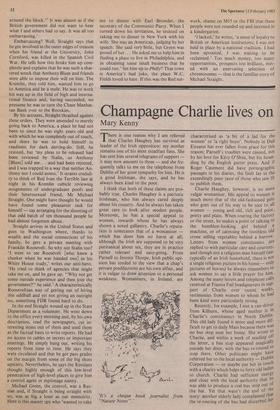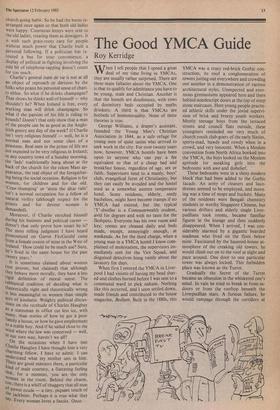Champagne Charlie lives on
Mary Kenny
There is one reason why I am relieved that Charles Haughey has survived as leader of the Irish opposition: my mother remains one of his most steadfast fans. She has sent him several telegrams of support it may now amount to three — and she fre- quently talks to me on the telephone from Dublin of her great sympathy for him. He is a good Irishman, she says, and he has always been kind to the poor.
I think that both of these claims are pro- bably true. Charles Haughey is a patriotic Irishman, who has always cared deeply about his country. And he always has taken great care to look after modest people. Moreover, he has a special appeal to women, towards whom he has always shown a noted gallantry. Charlie's reputa- tion is sometimes that of a womaniser which has done him no harm at all; although the Irish are supposed to be very puritanical about sex, they are in practice rather tolerant and easy-going. From Parnell to Jeremy Thorpe, Irish public opi- nion has tended to the view that a chap's private predilections are his own affair, and it is vulgar to draw attention to a personal weakness. Womanisers, in Ireland, are
'It's a cheque book journalist from "Nature Notes".' characterised as 'a bit of a lad for the women' or :a right boyo'. Nobody in Dail Eireann has ever fallen from grace for this reason; Parnell's troubles were caused, not by his love for Kitty O'Shea, but his houn- ding by the English gutter press. And if Roger Casement did have pornographic passages in his diaries, the fault lay in the exceedingly poor taste of those who saw fit to publish them.
Charlie Haughey, however, is no mere vulgar womaniser. His appeal to women is much more that of the old-fashioned gent who goes out of his way to be nice to all women — young and old, rich and poor, pretty and plain. When touring the factory or the street, he makes a point of talking to the humblest-looking girl behind a machine, or of caressing the toothless old crone selling vegetables behind a barrow. Letters from women constituents are replied to with particular care and courtesy, and though not a religious man himself (un- typically of an Irish household, there is not a single religious picture in his home — onlY pictures of horses) he always remembers to ask women to say a little prayer for hitn. Among the many letters and telephone calls received at Fianna Fail headquarters in sup- port of Charlie over recent weeks, testimonies from women to whom he had been kind were particularly strong. Recently, for example, I met a van-driver from Kilburn, whose aged mother is .10 Charlie's constituency in North Dublin• This old lady found it more and more dif- ficult to get to daily Mass because there was no bus stop near her home. She wrote to Charlie, and within a week of sending off the letter, a bus stop appeared magicallY outside her door, with the bus re-routed to stop there. Other politicans might have referred her to the local authority — Dublin Corporation — or maybe put her in touch with a charity which helps to ferry old ladies to church. Charlie had sufficient energY and clout with the local authority that he was able to produce a real bus stop out of the hat. Yet that wasn't the end of the story: another elderly lady complained that the re-routing of the bus had disturbed her
church-going habit. So he had the buses re- arranged once again so that both old ladies were happy. Courteous letters were sent to the old ladies, treating them as dowagers. It is with such grass-roots care for people without much power that Charlie built a personal following. If a politician has re- routed a bus for your convenience, a display of political in-fighting involving the odd bit of telephone-tapping doesn't count for too much.
Charlie's general train de vie is not at all an object of reproach or derision by the folks who praise his personal sense of chari- ty either. So what if he drinks champagne? That shows he thinks well of himself — why shouldn't he? When Ireland is free, every working man will drink champagne. So what if the passion of his life is riding to hounds? Doesn't that only show that a man of the people can be as good as the Anglo- Irish gentry any day of the week? If Charlie isn't very religious himself — well, he is a normal man and not some class of a priesteen. Real men in the prime of life arc not expected to be very religious in Ireland; in any country town of a Sunday morning, the 'lads' traditionally hang about at the back of the church for the token Mass ap- pearance, the real object of the foregather- ing being the social occasion. Religion is for women, for children and for the old. `Craw-thumping' or 'atein the altar rails' isn't a normal occupation for a fellow of natural virility (although respect for the priests and for devout women is demanded).
Moreover, if Charlie enriched himself during his business and political career doesn't that only prove how smart he is? The most telling judgment I have heard pronounced on Garret FitzGerald came 'froth a female cousin of mine in the West of Ireland. 'How could he be much use? Sure, he's lived in the same house for the past twenty years.'
It is sometimes claimed about women (not proven, but claimed) that although they behave more morally, they have a less rigid definition of moral sense. The rabbinical tradition of deciding what is theoretically right and theoretically wrong 18 less meaningful to women than simple acts of kindness. Weighty political discus- sions on the rectitude of Charles Haughey as a statesman in office cut less ice, with many, than stories of how he got a poor family a house, or how he gave employment to a stable boy. And if he sailed close to the Wind where the law was concerned — well, in our own way, haven't we all? On the occasions when I have met Charlie Haughey I have thought him a very charming fellow, I have to admit. I can understand what my mother sees in him. There are good manners there, a particular ,I(Ind of male courtesy, a flattering feeling 'hat, for a moment, you are the only woman in the room. Behind the charm, 100, there is a whiff of thuggery that all men of Power exude — a tiny, piquant touch of the jackboot. Perhaps it is true what they say. Every woman loves a fascist. Once.







































 Previous page
Previous page